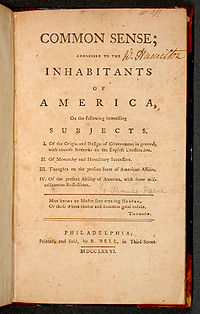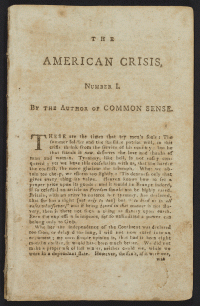Musings in History, by Bob Collins
 During the tumultuous year of 1776, the American patriot Thomas Paine wrote two tracts in order to rally colonists to join in the revolution against Britain – Common Sense, and The Crisis.
During the tumultuous year of 1776, the American patriot Thomas Paine wrote two tracts in order to rally colonists to join in the revolution against Britain – Common Sense, and The Crisis.

Common Sense was written in January of 1776, after armed conflict with the troops of George III had broken out at Lexington and Concord, but before there was any clear consensus as to what exactly the fighting was meant to achieve — reconciliation with the Crown under better terms, or independence. Paine’s wildly popular treatise inspired the colonies to move towards a separate future, and his pamphlet is credited with turning public opinion in support of the Declaration of Independence that was promulgated that July 4th.

The Crisis was written after the Revolutionary War had begun in earnest, during the apparently hopeless winter encampment in December of 1776 at Valley Forge — the bleak moment of the campaign that Paine deemed “the times that try men’s souls”. Paine challenged the fledgling nation to struggle on in pursuit of independence at this dark moment, when the will and resources to maintain the effort appeared exhausted.
Over the last fifty years a revolution has taken place in the approach that people take to the Crisis that is their own divorce; mediation has started to move marital separation away from sublimated warfare in the Courts towards a model based on private, rational discussions. Mediators have been helping institutionalize the shift of marital reorganization away from a clash over “rights”, bringing it back under the authority of the two people directly involved — a progression, as it were, from Common Law… to Common Sense. Mediators are helping couples recollect the forgotten truth that even though their marital relationship has not worked out as once hoped, and even in the presence of strong emotions, people are not suddenly incompetent to continue to make sensible decisions about their finances, and their family. Mediators are, in essence, applying a revolutionary approach that accepts and respects each person’s independence and the right to control their own lives even during divorce — the times that try their souls.
This form of Alternative Dispute Resolution — an American Divorce Revolution — is not being waged by armies clashing with muskets, but is coming about through mediators building a parallel system of justice by working with people — two at a time — to quietly facilitate the reorganization of their families through focusing on common sense discussions in mediation — assisting couples to deal rationally with the hostilities that have broken out in their lives, and guiding them through the crisis that precedes their own independence.
After all, as Paine himself said in Common Sense — “We have it in our power to begin the world over again”.
